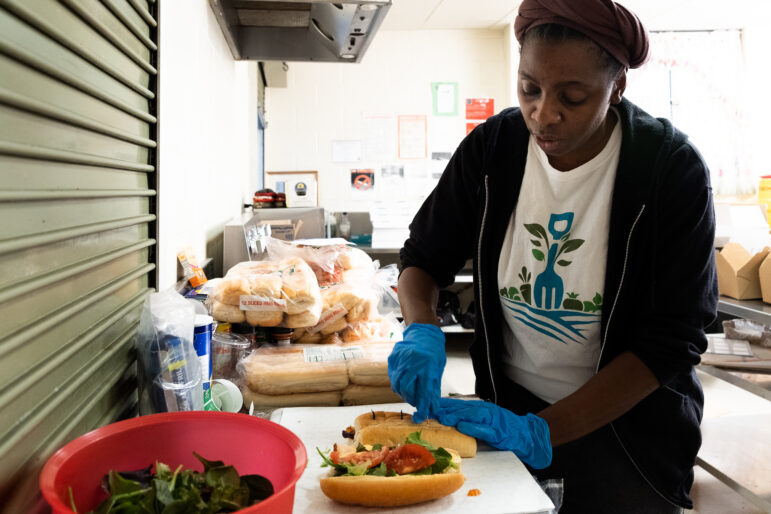“Philanthropy can be a linchpin, capable of bringing together the public sector’s authority and agenda-setting power and the private sector’s financial resources and dynamism. This was the clear lesson learned during the launch of the NYC Boss Up program to help entrepreneurs living in NYCHA housing expand their businesses.”

Adi Talwar
Niani Taylor, a graduate of NYCHA’s Food Business Pathways program, is among the growing number of public housing residents who’ve launched their own small businesses.We often hear that solving New York City’s myriad challenges—from an affordable housing crisis to growing a more equitable economy that works for all New Yorkers—will require an all-hands-on-deck approach. Usually, leaders use the “all hands” phrase to signal the need for cooperation between the public, nonprofit, and private sectors.
It can be challenging at times to bring these parties together, but the charitable sector, when it’s working at its best, can act as a catalyst to invent new solutions. With its creativity, flexibility, and mission-driven focus, philanthropy can be a linchpin, capable of bringing together the public sector’s authority and agenda-setting power and the private sector’s financial resources and dynamism.
This was the clear lesson learned during the launch of the NYC Boss Up program to help entrepreneurs living in NYCHA housing expand their businesses. The program provides $20,000 grants and business development courses to the winners of a “Shark Tank”-style competition. The first cohort of nine winners in the annual program, founded through a partnership between the Ron and Kerry Moelis Family Foundation and FJC, was announced this spring. The program was so successful that a new program exclusively for veterans living in the five boroughs launched this month. Veteran entrepreneurs can apply by Oct. 6.
The program addresses a common obstacle facing low-income entrepreneurs: lack of access to capital to launch or expand a promising business. Starting a full-blown, full-time business is always difficult, but especially without seed capital that often comes from family wealth or small business loans. Most public housing residents do not have the collateral or documented business track record that it takes to access those resources. Prospective entrepreneurs in NYCHA communities also struggle to access programs designed to help small business owners: in 2019, just 496 NYCHA residents participated in NYC’s small business development programs.
Entrepreneurship should be a vital pathway for public housing residents to boost incomes and build wealth. Just 42 percent of New York City’s public housing residents reported earned income from employment in 2019 and nearly a quarter of those jobs were in retail, hotels, or food, industries that have lagged behind the city’s post-pandemic economic recovery. Side hustles and home-based businesses offer an alternative to the longstanding barriers many public housing residents face in accessing well-paying jobs. Despite this clear opportunity, just 1 percent of NYCHA residents reported business income in 2021.
That low rate obscures the entrepreneurial potential that exists among NYCHA residents. The number of NYCHA residents reporting business income actually jumped from 286 residents in 2012 to 1,636 in January 2021—a dramatic 472 percent increase. Countless more residents run informal businesses that provide income. The challenge was to develop a program that could deliver resources quickly to entrepreneurs and inspire others to see starting a business as a viable pathway to build income and wealth.
While many philanthropic initiatives are driven by the passions of funders working in isolation, the Boss Up initiative was informed by a deep engagement with the issues and the landscape. Inspired by research from Center for an Urban Future, a policy think tank which identified the entrepreneurship opportunities open to NYCHA residents, we combined existing programs and capabilities from government and nonprofits with new financial resources to create a unique, impactful program.
Our partners included NYCHA, NYC Department of Small Business Services, the BOC Network, and the Brooklyn Public Library. Together, we were able to launch the program within a few short months. From more than 275 applications received—a strong response that indicates the need for more programs like this—the team selected 23 finalists who were each asked to develop a business plan and pitch their business to a selection committee. Less than a year after the first spark of an idea, we were distributing truly impactful business development training and monetary awards to nine winning businesses.
This kind of partnership doesn’t happen spontaneously—it requires specific knowledge of how nonprofits, private funders, and government agencies work, and how they can work together. But the value of pursuing truly creative, engaged philanthropy is crystal clear in helping align interests across sectors, catalyze unique resources in new ways, and create new programs that have real impact in people’s lives.
The Boss Up program is an example of philanthropy at its best and it should prompt all of us to think differently about how we work. If we can form more connections between imaginative donors, entrepreneurial nonprofits, and the public sector there is no limit to the new, creative solutions we can develop to improve people’s lives.
Sam Marks is the chief executive officer of FJC – A Foundation of Philanthropic Funds.








